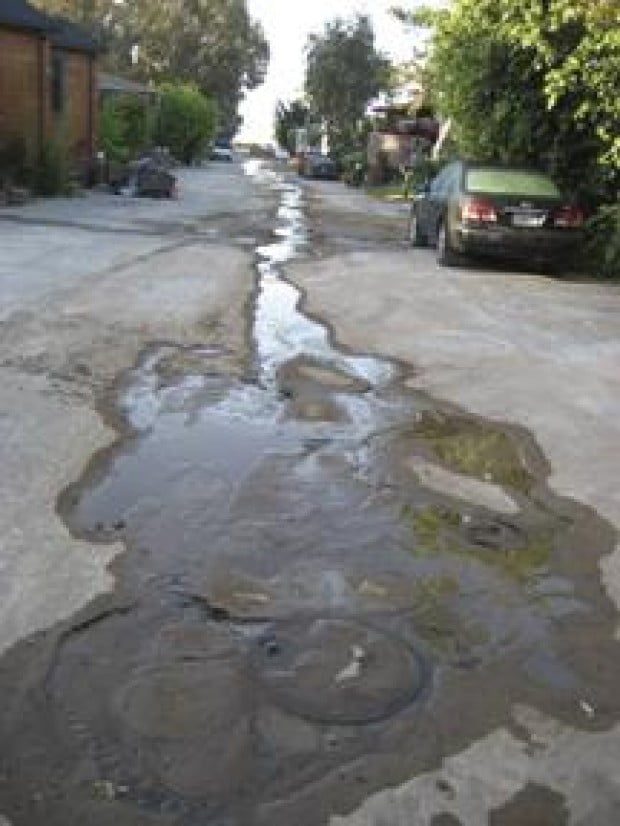
The spill highlights the aging septic system at the mobile home park; a new wastewater treatment facility at the park has been delayed nearly two years.
By Dena Feingold / Special to The Malibu Times
Last Wednesday, raw sewage flowed down one of the residential streets in Paradise Cove Mobile Home Park. Photos taken by one of the residents in the mobile home community have been circulating on a Los Angeles-based Internet blog showing the flowing sewage. The spill highlights the problem the community of 500 residents is contending with-an incomplete sewage construction project that was supposed to be finished nearly two years ago. The owner of the park, the Kissel Company, could be facing hundreds of thousands of dollars in fines because of the delays in construction of the project.
Malibu city officials said a 2,500-gallon tank had been emptied out for construction purposes on the Tuesday night before. Overnight, the tank had filled up due to a flowing toilet in an unoccupied unit, or units, at the mobile home park. The tank had reached maximum capacity the next day and had spilled about 200 gallons, but did not reach any of the storm drains. As a result, the beach did not have to be closed.
“As a city, we had not been notified of any leakage or spill, but as soon as we saw [the spill at Paradise Cove], we went out to the site and investigated what had gone on,” City Manager Jim Thorsen said. “This has a been a problem for us in that we don’t always receive the reports of when these are occurring so that we can respond to them immediately to take the appropriate action. And, in this particular case, that’s what happened.”
Mark Gold, director of Heal the Bay, said there’s been a long history of issues with wastewater in Paradise Cove. Paradise Cove Beach has been frequently listed as one of the top 10 in the organization’s list of California’s worst beaches due to poor dry-weather water quality.
“It’s something that obviously is unacceptable from the standpoint of protection of public health and protection of the Santa Monica Bay,” Gold said. “But the larger issue that this points out is that it’s still occurring when the mobile park has been under a time-schedule order for the better part of the last five years to upgrade their on-site wastewater treatment system so that it adequately treats the sewage and prevents any further day-lighting episodes.”
Exposure to untreated wastewater, Gold said, is one of the most well understood public health risks that occur in the environment.
“The sorts of things that are very common are the stomach flu-gastrointestinal sorts of illnesses,” Gold said.
A construction project that began in July 2005 to replace dozens of aging septic tanks, which was to be completed by September 2005, still remains unfinished and is scheduled for completion in the next month.
“It is an extremely complicated and large project, which is why it is taking as long as it is,” said Steve Dahlberg, president of the Kissel Company, owner of the ocean-side mobile home park. “It took us almost three and a half years to get final approvals for the whole project.”
The delay, Dahlberg continued, is related to the expense of who is paying for the new septic system, issues with the city of Malibu and with permitting.
“There was some confusion over who issued the permit, whether it was the city of Malibu or a state agency, Housing and Community Development,” Dahlberg said. “That took some time to resolve.”
Malibu city officials said the Kissel Company has a time requirement for the installation of the on-site wastewater treatment system, and because they are not in compliance with the timeline, the Regional Water Quality Control Board, as of Nov. 1, has the ability to levy a fine of up to $3,000 a day.
“We won’t have a handle on the fine situation, or if there are any fines, until after we are complete and we hear from the Regional Water Quality Control Board,” Dahlberg said.
Dahlberg declined to comment on the sewage spill last week.
The existing septic system is operating as the new system is being installed next to it.
Originally installed several decades ago, “the systems just outlived their usefulness,” Dahlberg said. The replacement system is being installed by JS Innovative Systems and will contain approximately 14 tanks and 75 septic pits. When the construction is completed, the streets will be repaved immediately, Dahlberg said.
The Kissel Company is paying for the first $2.2 million in expenses related to the installation of the new septic systems. Once the system is complete, any overages will be passed on to the residents by way of rental increases.
In a separate water quality matter, the city council Monday night authorized the city manager to execute a contract with MNS Engineers Inc. to design the Paradise Cove Stormwater Treatment Facility not to exceed the cost of $135,480. It will replace the prototype that has been in place for more than a year, and will treat stormwater runoff from Ramirez Creek.
